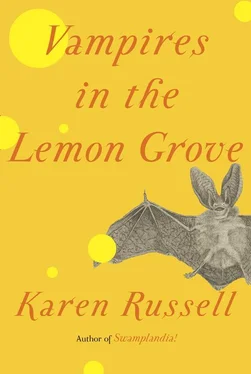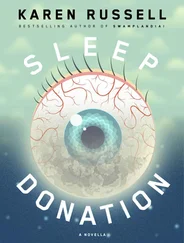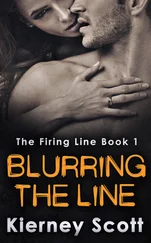“Well, you’ve got some museum-quality … jammous back here, Sergeant.” She smiles, tracing one’s ear. She can see red veins along the pink interior. Sunlight licks at each sudsy curl.
“Yeah. Thanks. My artist is legendary. Tat shop just outside Fort Hood.”
The brightest, largest object in the tattoo is a red star in the palm grove — a fire , Derek Zeiger tells her, feeling her tracing its edges. He doesn’t offer any further explanation, and she doesn’t ask.
She begins effleurage , drawing circles with her palms, stroking the oil onto his skin. The goal is to produce a tingling, preparatory warmth — a gentle prelude to the sometimes uncomfortably strong pressure required for deep tissue work. Most everyone enjoys this fluttery feeling, but not so Sergeant Zeiger. Sergeant Zeiger is thrashing around under her hands like Linda Blair’s understudy.
“Christ, lady,” he grumbles, “you want to hurt me that bad, just reach around and twist my nuts.”
Effleurage is a skimming technique, invented by Swedes.
“Sergeant, please. I am barely applying any pressure. Forgive me for saying this but you are behaving like my nieces.”
“Yeah?” he snarls. “Do you twist their nuts, too?”
Healing is a magical art , said the pamphlet that first attracted the nineteen-year-old Beverly to this career. Healing hands change lives .
“Healing hurts sometimes,” Beverly tells the soldier briskly. “And if you cannot hold still, we can’t continue. So, please—”
People can do bad damage to themselves while trying to Houdini out of pain. Beverly has seen it happen. Recently, on a volunteer visit at the county hospital, Beverly watched an elderly woman on a gurney dislocate a bone while trying to butterfly away from the pins of her doctors’ hands.
But ten minutes into their session, Beverly can feel the good change happening — Zeiger’s breathing slows, and she feels her thoughts slowing, too, shrinking into the drumbeat of his pulse. Her mind grows quieter and quieter within the swelling bubble of her body, until all her attention is siphoned into her two hands. The oil becomes warm and fragrant. A sticky, glue-yellow sheet stretches between her palms and the sergeant’s tattoo. Each body, Beverly believes, has a secret language candled inside it, something inexpressibly bright that can be transmitted truly only via touch.
“How does that feel now? Too much pressure?”
“It’s fine. It’s all good.”
“Are you comfortable?”
“No,” he grunts. “But keep going. This is free, right? So I’m getting my money’s worth.”
Bulls stare up at her from the river. Their silver horns curl like eyelashes. Under her lamp, the river actually twinkles. It’s amazing that a tattoo needle this fine exists. Beverly, feeling a bit ridiculous, is nonetheless genuinely afraid to touch it. She has to force herself to roll and knead the skin. For all its crystalline precision, the soldier’s tattoo has a fragile quality — like an ice cube floating in a glass. She supposes it’s got something to do with the very vibrancy of the ink. Decay being foreshadowed by everything bright. Zeiger is young, but he’ll age, he’ll fade — and he’s the canvas. Zeiger is now breathing deeply and regularly, the village rising and falling.
At a quarter to four, Beverly begins to wind down. She makes a few last long strokes along his spine’s meridian. “Time’s up,” she’s about to say, when she notices something stuck beneath her pinky. When she moves her hand she slides the thing across the sky on Zeiger’s shoulder, still tethered to her finger like a refrigerator magnet. Only it’s flat — it’s inside the tattoo. No, she thinks, impossible, as she continues floating it around his upper back. An orange circle no larger than a grocery SALE sticker. It’s the sun. Beverly swallows hard and blinks, as if that might correct the problem. She draws her pinky halfway down his spine, and the sun moves with it. When she lifts her little finger, the sun stays put. She can’t stop touching it, like an idiot child at a stovetop — well, this is trouble, this is a real madhouse puzzle. The sun slides around, but the rest of the tattoo stays frozen. The cows stare at the grass, unalarmed, as it zings cometlike over their horns. The soldiers’ faces remain stiffly turned to the west, war-blasé, as the sun grazes their helmets …
She gasps, just once, and Sergeant Zeiger says in a polite voice, “Thank you, ma’am. That feels nice.”
“Time is up !” Ed raps at the door. “Bev, you got a four o’clock!”
The door begins to open.
“Ed!” she calls desperately, pushing the door back into its jamb. “He’s changing!”
And when she turns around, Derek Zeiger is changing, standing behind the hamper and hopping into his pants. His arms lift and pull the world of Fedaliyah taut; Beverly gets a last glimpse at the sun, burning in its new location on the Diyala River.
Beverly swipes at her eyes. When she opens them, the tattoo is gone from view. Now Sergeant Derek Zeiger is standing in front of her, just as advertised on his intake form: 6′2″, a foot taller than Beverly, and he is muddy-eyed indeed, squinting down at her through irises that are brown, almost black. He draws a hand from his pocket—
“Well, thank you, ma’am.” Inexplicably, he laughs, scratching behind one ear. “I guess I don’t feel any worse.”
“Sergeant Zeiger—”
“Derek,” he says. “Derek’s good.”
She notices that he winces a little, just walking around. He pushes a hand to the small of his back like a brace.
“Oh, it’s been like this for months,” he says, waving her concern away. “ You didn’t do this. You helped. It’s a little better, I think.”
And then she watches him straighten for her benefit, his face still taut and bloated with pain.
She can feel her face smiling and smiling at him, her hand shaking in his:
“Then you have got to call me Beverly. None of this ma’am stuff.”
“Can I call you Bev?”
“Sure.”
“What about Beav?” He grins into the distance, as if he’s making a joke to people she can’t see. “Beaver? Can I call you The Beav?”
“Beverly,” she says. “Can you do me one favor, Derek? The next time you’re in the shower—”
“Beverly!” He swivels to give her a big, real grin. “I’m shocked! It’s only our first date here …”
“Haha. Well.” Beverly can feel the blood tinting her cheeks. “Just be sure to get all the oil off. And should you notice — if you feel any pain? Or — anything? You can call me.”
She’s never given her home number out to a patient before. As the sergeant turns his back to leave, shouldering his jacket, she mumbles something about muscle adaptation to deep tissue massage, the acids that her hands have released from his trigger points. How “disruptions” can occasionally occur. The body unaccustomed.

At the Hoho’s Family Restaurant, Beverly treats herself to peanut butter pancakes and world news. She grabs a menu and seats herself. She’s a longtime patron, and waiting for service always gives her a crawling, uncomfortable feeling. Beverly often finds herself struggling to stay visible to waitstaff, taxi drivers, cashiers. She tries hard to spite the magazines and persist in her childhood belief that aging is honorable, to wear her face proudly, like a scratched medallion, the widening circles of purple under her eyes and the trenches on her brow. To be that kind of veteran. A woman aging “gracefully,” like the church ladies she sees outside Berea Tenth Presbyterian, whose yellowed faces are shadowed by wigs like cloudbursts. In truth, Beverly can never quite adjust to her age on the calendar; most days, she still feels like an old child. She spends quite a lot of time trying to communicate to strangers and friends alike that her life situation is something she chose: “I never wanted anything like that, you know, serious, long-term. No kids, thank God. My patients keep me plenty busy.”
Читать дальше













